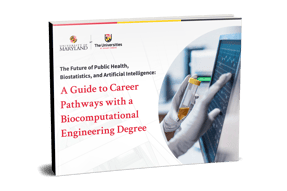Since the 1970s, bioengineers have created groundbreaking solutions to many of the world’s most pressing health challenges at the convergence of biology, engineering, and medicine. Compared with other engineering disciplines, this field is young - but critically important. In the past decade alone, bioengineers have made pivotal discoveries that will forever shape our understanding of how genes operate, why cancers spread, and how therapies can break through what’s known as the blood-brain barrier to target hard-to-reach spots in the body where diseases often “hide.”
But, the rapid advancement of computing technology has added a new layer of challenges - and opportunities - to the mix. Today’s leading innovators operate in a new realm where solutions are found at the nexus of biology, engineering, and computer programming.
Yet, many who feel called to address human health needs might balk at the idea of logging long hours working in a lab handling chemicals or waiting for cells to grow. Instead, they find their inner zen behind a computer screen, writing code or applying algorithms that allow them to tease critical information from massive amounts of data. For these innovators, their dream job is one in which they can apply these skills for the greater good of society - such as to develop cutting-edge wearable technologies that could help slow the spread of infectious diseases or enable diabetes patients to monitor their glucose levels noninvasively.
A Growing Demand for Data Science Skills
“Computational methods and data science are exploding into every facet of the world, particularly across engineering,” said Jarred Callura, a University of Maryland biocomputational engineering (Biocomp) faculty member. “There are very few degrees nationwide that combine the fundamentals in biology and quantitative problem-solving with computation and data science skills. This sets biocomputational engineering graduates apart from all others - including bioengineering, computer science, and biology graduates. Our Biocomp alumni will enter the workforce equipped to contribute unique expertise to biotech firms, consulting firms, and a wide range of businesses specializing in health care, medicine, and bioinformatics.”
Callura, a Greenwood, S.C. native, earned his Ph.D. in biomedical engineering from Boston University before branching into industry. His interests span biotechnology, synthetic biology, and genome editing. Prior to joining the Biocomp faculty roster, Callura taught - and continues to teach - Genome Editing and Synthetic Biology to students enrolled in UMD’s professional master’s degree in bioengineering.
Building and Leveraging a 'Foundation of Knowledge' for Public Health
“One thing I learned in industry that I will emphasize to my students is the need to constantly teach yourself new things,” Callura said. “At each of my different stops in industry, there were critical parts of my job that were brand new that I had to learn fast and, even once I got up to speed, I found the science moves so quickly that you need to continually add to your knowledge base and skill set.
“I want students to graduate from the Biocomp program knowing how to think like an engineer and problem solve, and I want to help them establish the practice of continually adding to their foundation of knowledge built at UMD,” he continued. “This will help prepare them for the fact that, wherever their careers lead them, they will need to learn new concepts - and learn them quickly - to adapt to changes in the field in the years to come.”
Having worked in synthetic biology and genome editing for more than a decade, Callura has seen how new technologies can take the field by storm at a moment’s notice.
“I have seen firsthand the shift from low-throughput, rational design to high-throughput, computational-driven design for different bioengineering applications,” he said. “In many cases, a data science skill set is critical to innovate in these burgeoning fields. I am excited that UMD now complements their outstanding bioengineering degree program with a biocomputational engineering degree program that opens up a world of even more opportunities for UMD students to engineer the future.”
The Clark School will begin accepting transfer applications in January 2021 for Fall 2021 enrollment in the BCE degree program.





